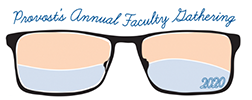Breakout:
Trust in Scholarship: How to Avoid Predatory Publishers and Conferences
Time:
Location:
Do you receive unsolicited invitations to share your research? “Dear Dr. <your name here>, We are honored to invite you to contribute a <paper/book chapter/presentation> at our distinguished <journal or conference>”. How can you tell if the publication or conference is legitimate? Has the fear of “predatory publishers” given you cold feet?
Are you excited to disseminate your research and looking for a good venue to reach your target audience? Are you intrigued, but wary, of the equity and global reach of open access publications? How can you evaluate the quality of unfamiliar research outlets and avoid unethical ones?
Stress no more. In this workshop you will learn tools and techniques to help you evaluate unfamiliar publishers and conferences. You will come to identify indicators of trust and red flags of caution. Apply these skills to your assessment of all dissemination methods: traditional journals and books, open access publications, conferences, and webinars. Learn how to avoid broad strokes that may lead to First World biases. Review the pros and cons of using black lists. Be able to identify reasonable article processing fees (APCs) and the role they play in both deceptive and legitimate publishing.
Learning Objectives:
- Participants will learn the key criteria for evaluating credible research outlets and how to avoid biases in selecting dissemination venues.
- Participants will gain experience applying specific evaluation criteria to real world examples of publication and conference venues in various disciplines.
- Participants will build a tool kit of databases and resources to use in the evaluation of dissemination choices and be equipped to share with colleagues and students.
Speakers & Panelists
Perry CollinsPerry Collins is the Scholarly Communications Librarian at the George A. Smathers Libraries, where she manages initiatives promoting open access in scholarship and education, intellectual property literacy, and digital publishing. Before joining UF in 2018, Collins held a similar position at the Ball State University Libraries, and worked for six years as a program officer in the Office of Digital Humanities at the National Endowment for the Humanities, a U.S. federal funding agency. Collins holds a M.L.I.S. from the University of Illinois at Urbana-Champaign and M.A. in American Studies from the University of Kansas.
Suzanne Stapleton
Suzanne Stapleton is the Agricultural Sciences and Digital Initiatives Librarian at the George A. Smathers Libraries. She provides instruction, reference service, and participates in scholarly communications, focusing on research metrics and open access publishing with Florida Online Journals. Her research interests include information literacy, library publishing, publishing practices of agricultural scholars, and digital preservation of agricultural publications. Suzanne earned a Master of Science degree in Vegetable Crop Production from Cornell University and a Bachelor of Arts degree in Latin American Studies from Carleton College. Prior to joining the UF Libraries, Suzanne was a UF/IFAS Extension Agent.
Michelle Leonard/Tara Cataldo
Michelle Leonard is an associate university librarian in the Marston Science Library. She teaches workshops on the responsible conduct of research (RCR). Michelle served as the Principal Investigator for the $298,000 National Science Foundation grant project "Gaming Against Plagiarism" (2010-2012). She is the co-coordinator for the RCR Stakeholders Group, and served as a member of the Academic Integrity Task Force. Tara Cataldo is the Biological Sciences Librarian in the George A. Smathers Libraries. She provides research and instructional support to the life science departments and directs the collections' operations of the Marston Science Library. Her research focuses on the use of digital information in higher education. Tara has her M.L.S. from the University of South Florida and she has been a librarian at UF for 20 years.

